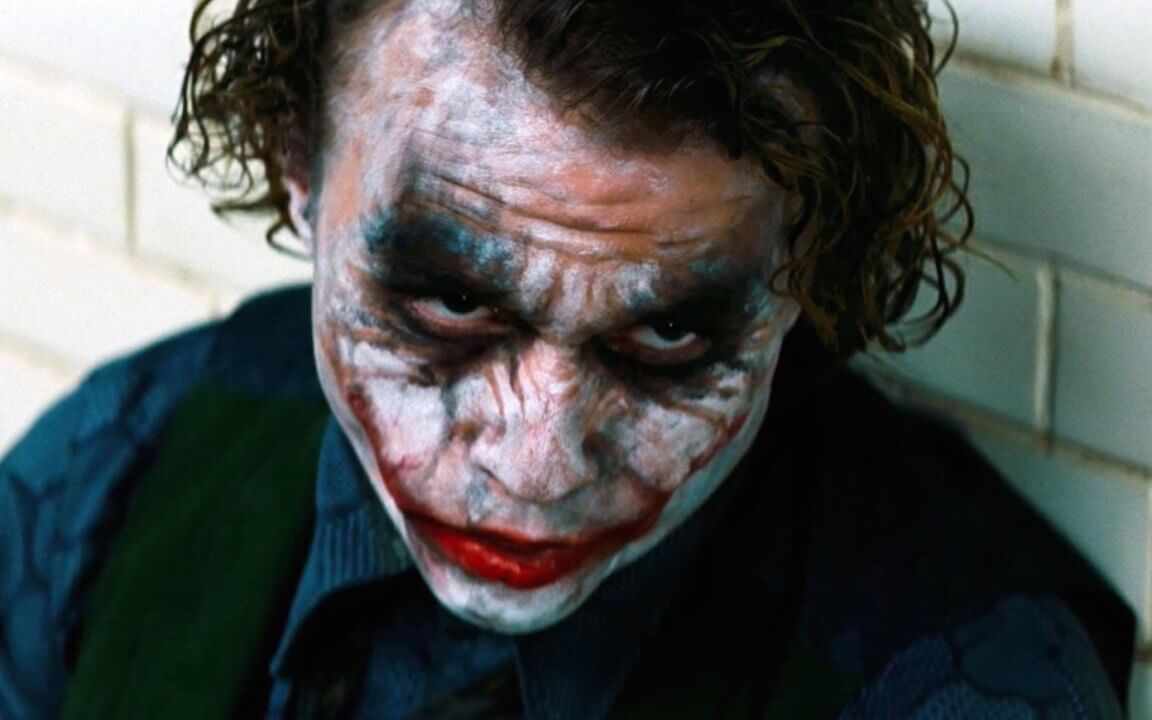(For another look at worthy villains or game-design/ writing tips, check out the exclusive “Building the Ideal End Boss”)
I crave movies like some people crave food. Soda. Cigarettes or exercise. I’m the friend who’s able to tell you that in the Alien movies, the space crew’s interactions with the alien are based off of the Vietnam War, where a technologically-advanced army was rendered impotent against a less-advanced foe. I’ve seen and read a lot of bad guys, studied how to craft them as unique or as offshoots of archetypes, such as the bully, the siren, or the gangster.
Still I feel sure claiming the Joker is the most frightening villain ever to hit fiction—print, comic, or screen.
REASON ONE: The ugliness is deeper than skin.
Many actors have portrayed the Joker. In my opinion, none induce the horror of Heath Ledger’s tongue-flicking Joker, though Jack Nicholson’s Joker was no laughing matter himself. But in The Dark Knight Ledger didn’t just wear the makeup. He let the makeup wear him.
Sure, that’s a wonderful, meta-sounding statement, but how true is it?
Let’s look at the opening scene when Joker wears a clown mask to robs a bank alongside his hired cronies. He still wears the makeup underneath. The paint is not a mask for him, like the rubber one. It’s a key part of his identity that he decides needs to be hid in that moment. Unlike some bad guys, whose character design seems solely to humor the audience’s expectations of a “bad guy,” the Joker’s appearance is the product of his character. His frightening exterior goes deeper than the skin.
Issuing a threat to Gotham into a handheld camera, his cackles blasting against the camera lens, there’s no way to see anything but the scar-faced psychopath who insists he’s not crazy. We’ve all heard the question, “Wanna know how I got these scars?” The Joker gives multiple answers, one as dark as the next. While he gets villain points for creeping us out with these tales and the murders they precede, that’s not enough to call him the scariest villain ever. What makes him the scariest is that the answer to the question isn’t at all necessary for the fear factor. We observe those garish, bumpy lines and it becomes obvious that the face paint isn’t merely a masquerade for him, as it is on the Batman copycat he kills and paints a Joker face on. For the Joker, the paint is an elaboration of the scars, and the scars are an integral part of who he is.
While the Joker was clearly created to stand as a challenging, moral counterpoint (and temptation) for Batman, he still stands as a perfectly legitimate villain on his own, scars and all. All his clown-faced, cut-up craziness fits cohesively in his character, and so even if purple suits isn’t the James Bond style, you can still rather easily imagine the Joker in a James Bond plot line, can’t you? I can. It’s not like putting Sauron in Indiana Jones or Voldemort in Batman. These scars, whatever caused them, are the product of a stepping stone that brought him from whoever he was before to what he chose to become.
And that’s terrifying enough.
REASON TWO: A real-world philosophy and justification.
New York Daily News in a 2008 editorial called the Joker an “indelible character” while discussing the danger of the role itself—praise few other villains receive and live up to.
But what makes the Joker any more “indelible” than any other bad guy well-played by a skilled actor?
The Joker has an influence that goes beyond blackmailing cops to do his bidding. His power surpasses the ability to attract paranoid schizophrenics and former patients of Arkham. He’s indelible because his philosophy is contagious. By what many consider “reasonable” standards, his arguments are utterly rational.
Take a moment to linger on all the atrocities he commits.
Now understand that his philosophy and justification for those actions depend on not believing that human life, the universe, or anything in existence at all has any meaning or value beyond what we “arbitrarily” try to give them. The Joker tears down what pretenses of meaning are accepted by “self-deluded,” hopeful people by showing the hard “truth” of the universe. He makes us realize that if everything in our world simply exists without a higher, intelligent purpose, if it all just exists because it does and so do we (shrug), then everything is just chaos and whimsy.
If you believe nothing has meaning, too, you can’t deny that the Joker has very justifiable motives for playing with Gotham, Batman, and peoples’ lives. And if he kills, so what? Those people were just cogs in a big, meaningless wheel. They’re just biological masses of nerves and synapses, to be born and die and do other things while their biological masses still functions on blind autopilot, seeking pleasure in whatever form it takes.
And if the Joker appreciates the pleasures of life-snuffing and pain, so what? If he kills someone you take pleasure from, you can try to stop him. But his charismatic philosophy will still entice followers and likely, after a while, entice you as well.
Hence why he’s so terrifying. By some reasonings, he has a legitimate license to kill. Many of us will instinctually reject his actions and deny his justifications. Yet people who believe in the Joker’s philosophy exist all over the world, and he devotes himself to “liberating” us from our rule-laden mindsets. And this is where he’s truly terrifying: how he steps off the page or screen and straight into the real world.
Most monsters you can tell yourself aren’t real. Him, you can’t.
If a viewer lets the Joker’s belief of purposelessness get to them, it induces a hopelessness that quickly turns to viciousness, and just like that, the clown’s beliefs can become our beliefs. It’s not even because he’s charismatic, which he is, but because to our physical senses, his ideas are rational. “What else is there besides what we can see? Why should we have hope about anything? Isn’t it all just chance and blind optimism? Why shouldn’t he do as he does?”
That’s moral relativism, folks. “Does it depress you, Lieutenant, to know how alone you are?”
The philosophy’s infectious, more often fatal. It makes him all the more heinous and fearful a villain. There’s no reason for us not to believe him if we harbor a world view that preaches everything is the product of happenstance and chaos, that good and evil aren’t a natural realities but man-made.
He asks the most fundamental questions and poses the most fundamental threat of any bad guy, not pursuing your death but your soul. And to fight him, you really have to believe what he doesn’t.
“It’s not about money. It’s about sending a message… Everything. Burns.”
In the image above, the Joker dangles upside-down, caught by Batman at last. Did you ever notice how the camera switches to show both Batman and the Joker as upright? It could be done to make the exchange easier on viewer’s eyes. Perhaps, though, there’s more to it. Perhaps it shows Joker as upright to compliment his final argument and say, even though his coattails may seem to be over his head, Joker may be the one right-side-up.
THREE: Real-life impact: The monster that escapes the television.
The Joker is a Satan figure if ever there was one, and just like he defeated Harvey Dent in The Dark Knight, the Joker defeated Ledger in a tragic, real-world way when the role apparently pushed the Australian actor over the edge, and he took his own life. I don’t mean to clinically postulate or make heartless claims about what specifically led to Ledger’s tragic end, nor to make light of it. Yet it’s impossible to doubt that the role had something to do with Ledger’s final actions.
That the Joker can reach off the screen like this to impact real people… It only emphasizes his frightening influence.
Fearfully, (and what almost persuaded me not to publish this article,) was the power his justifications and philosophy can have on the susceptible viewer or reader. I myself have struggled to write this because of the depressing spirit it brings on. But I think it’s also worth writing because it’s wise to know one’s enemies.
Other villains get hung up on vendettas or colorful agendas, their evil schemes contrived by writers to turn readers against him. The Joker is not contrived in this way. He’s an honestly written villain. He slams the audience, those already vulnerable to the hope-sucking meaninglessness of his philosophy, into the table like he does the mobster, making the pencil and his philosophy disappear while leaving behind their undeniable effects: bodies.
FOUR: Beyond what he looks like, says, or does: it’s the unknown.
Only one trait shared among “monsters” is generally agreed upon: They’re in some way unknown or unknowable, a stranger and a mystery and thus dangerous. The Joker falls perfectly into this category. While many claim he’s crazy, and while this might be so, he is still very conscious of and responsible for his actions. His motives are his philosophy. So he represents the man who’s dug into the darkest part of his being and pulled up all of his worst characteristics, relativizing the good away. G. K. Chesterton wrote on the dangers of trying to empathize with people like him. To paraphrase, ‘We already know why they do bad things: Because it’s dreadful fun!’ We can understand this desire, but we shouldn’t approach it ourselves, or risk becoming them.
The Joker’s “carefree” darkness should remain unknown to us. Usually the key to defeating a bad guy is understanding them, but the Joker cannot be re-humanized or passed off as a flat “bad guys.” He explicitly chooses to rid himself of humanity and be the roundest form of pure evil possible and requires understanding only insofar as Alfred explains him (again paraphrasing):
Some men don’t want anything logical. Some men just want to see the world burn.
You can’t fight fire with fire. The Joker cannot be fought by the Joker. Jokers can only work in tandem. So they must, as scary as it is, remain unknowns, shrouded in their monstrous guise.
Light at the end of the tunnel:
I am adamantly against the Joker’s view. I do believe there is meaning to existence, and that our choices have moral repercussions—and I don’t just mean as a historical domino effect. It’s important to remember that the Joker is a bad guy, and the purpose of a bad guy is to show us how we shouldn’t think and behave and why. His poor example should empower us to battle such people and ideas, and not to just sit down and take it when they would drag us down with them and stomp on our hope.
(Hope is often mistaken as blind optimism. Truly, though, hope sees through the darkness that optimism ignores, trusting that past all of the Joker’s evil deeds, there are two ferries full of prisoners and civilians who won’t blow each other up.)
Furthermore, the Joker is a bad guy. His singular beliefs and what he stands for are only his—the ideas of one small, twisted, fallible man. We shouldn’t empathize with him for this, but should learn a lesson from his example. Especially as a story character, who’s used to represent broader ideas, his defeat means the fall of his philosophy as well. Such attitudes as his can and should be conquered, especially within ourselves, because every person does have intrinsic value.














